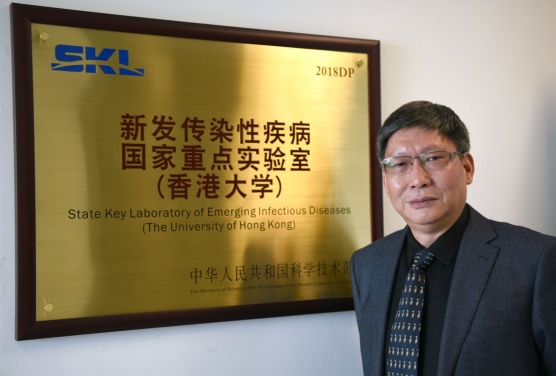2021 John Dirks Canada Gairdner Global Health Award
Two distinguished scholars of the LKS Faculty of Medicine, The University of Hong Kong (HKUMed), Professor Guan Yi and Professor Joseph Sriyal Malik Peiris, have been awarded the 2021 John Dirks Canada Gairdner Global Health Award for their significant contributions to understanding the origins and options for control of newly emerging infectious disease outbreaks in Asia, notably zoonotic influenza and severe acute respiratory syndrome (SARS).
Professor Guan and Professor Peiris are the first HKUMed laureates of this prestigious global award by the Gairdner Foundation. Former president and vice-chancellor of The University of Hong Kong (HKU), Professor Tsui Lap-chee received the Canada Gairdner International Award, also by the Gairdner Foundation, in 1990 for his contributions to the identification of the gene for cystic fibrosis.
Laureates of 2021 John Dirks Canada Gairdner Global Health Award
Professor Guan Yi
Chair Professor of Emerging Viral Diseases, Daniel C K Yu Endowed Professor in Virology, School of Public Health, HKUMed; Director, State Key Laboratory of Emerging Infectious Diseases, HKU; Director, Joint Institute of Virology (Shantou University-The University of Hong Kong) & Director, Guangdong-Hong Kong Joint Laboratory of Emerging Infectious Diseases, Shantou University; Co-Director, World Health Organization (WHO) H5 Reference Laboratory.
Professor Joseph Sriyal Malik Peiris
Chair Professor of Virology, Tam Wah-Ching Professor in Medical Science, School of Public Health, HKU; Honorary Director, HKU-Pasteur Research Pole; Honorary Consultant Microbiologist, Queen Mary Hospital, Hong Kong; Co-Director, WHO H5 Reference Laboratory and SARS reference laboratory, HKU; Co-Director, WHO reference laboratories providing confirmatory testing for COVID-19, HKU.
Their work
In the aftermath of the H5N1 avian flu outbreak in Hong Kong, Professor Guan and Professor Peiris initiated seminal studies of the emergence, evolution and pathogenicity of this virus and developed a highly effective programme for the monitoring and surveillance of avian and swine influenza viruses. Their subsequent work established and suggested the evidence-based new intervention measures including periodic live poultry market closures, emptying markets of poultry overnight to reduce virus amplification within these markets and the appropriate use of poultry vaccines to protect both poultry and people in Hong Kong from H5N1 infections. They have made major contributions towards understanding the emergence, transmission, epidemiology and pathogenesis of highly pathogenic and potentially pandemic avian influenza viruses including H5N1, H9N2, H7N9, H5Nx and others and have provided evidence-based options for the control of avian influenza viruses in Asia.
In 2003, Professor Peiris led the team that first identified the virus responsible for SARS in China, the SARS-CoV-1 coronavirus, elucidating its pathogenesis and transmission, and quickly developed a diagnostic test which was then shared internationally. Meanwhile, Professor Guan's team identified the human infectious source and zoonotic interface of SARS in the wild animal markets in Guangdong, China in 2003 and identified the human infectious source of Middle East Respiratory Syndrome (MERS) in Saudi Arabia in 2015. Professor Guan's research accelerated advocacy of the closure of wild game animal markets, averting a potential recurrence of SARS in 2004 and contributing to the control of MERS.
Impact of their work
Their investigations into the emergence and evolution of animal influenza H5 strains (and other H and N subtypes), as well as the identification of source, transmission, risk factors, virus infectivity and period of infectivity of the SARS coronavirus were critical in the successful responses to these outbreaks. Their open sharing of information with WHO and broader international community also directly resulted in the rapid control of SARS.
Professor Guan's and Professor Peiris' comprehensive strategies for surveillance, monitoring, identifying the human infectious source, investigation, diagnosis and control of emerging infectious disease outbreaks continue to provide critical guidance and insight for countries throughout Asia and the world, as seen by the world's responses to the 2009 swine flu pandemic, MERS and the COVID-19 pandemic.
About the Gairdner Foundation
The Gairdner Foundation was established in 1957 by Toronto stockbroker, James Gairdner to award annual prizes to scientists whose discoveries have had major impact on scientific progress and on human health. Since 1959 when the first awards were granted, 395 scientists have received a Canada Gairdner Award and 95 to date have gone on to receive the Nobel Prize. Annually, seven awards are given: five Canada Gairdner International Awards for biomedical research, one John Dirks Canada Gairdner Global Health Award, specifically for impact on global health issues, and one Canada Gairdner Wightman Award, reserved for a Canadian.
The Canada Gairdner Awards promote a stronger culture of research and innovation across the country through their Outreach Programs including lectures and research symposia. The programs bring current and past laureates to a minimum of 15 universities across Canada to speak with faculty, trainees and high school students to inspire the next generation of researchers. Annual research symposia and public lectures are organised across Canada to provide Canadians access to leading science through Gairdner's convening power.
For the Gairdner Foundation press release, click here.







